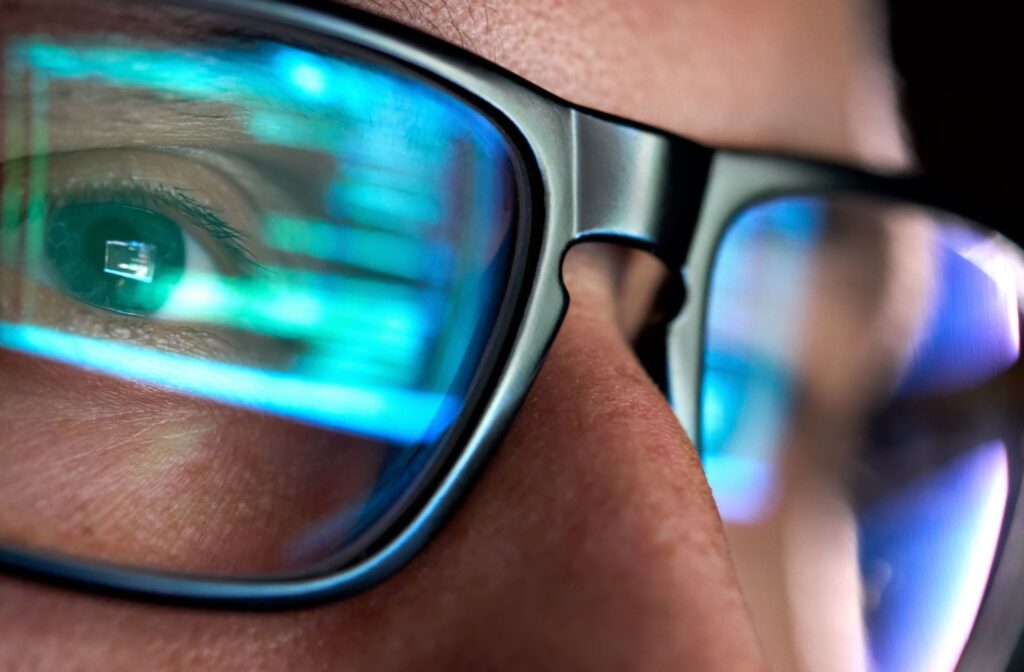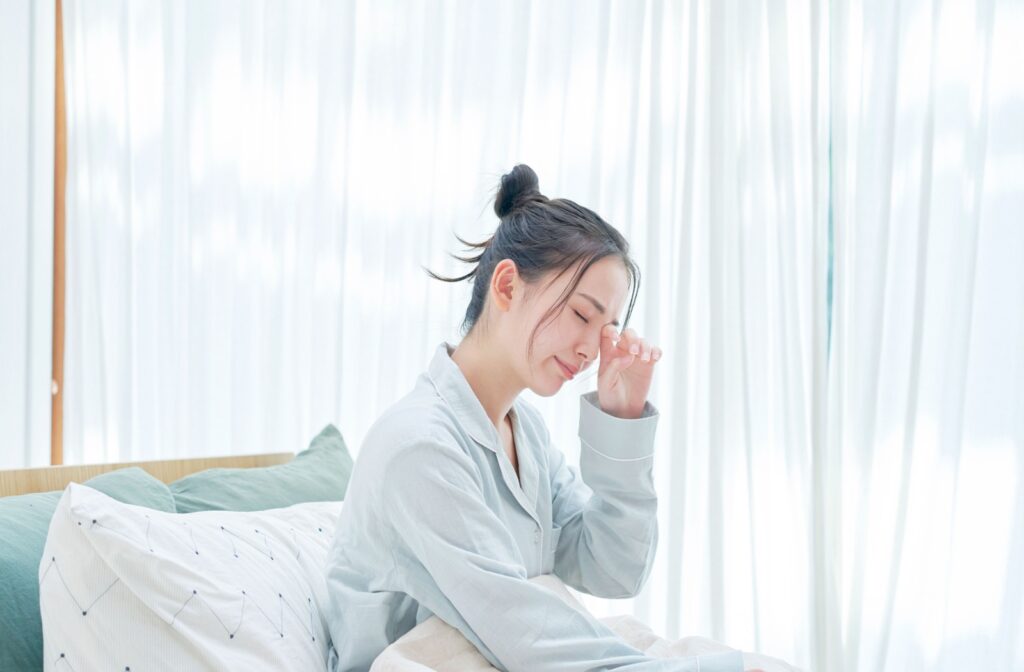Waking up with dry, gritty, or uncomfortable eyes can be a frustrating start to your day, and may even lead to intermittent blurred vision.
The primary reason your eyes feel dry in the morning is often a mix of your sleep environment, your eyelid function, and the quality of your tears. Your tear film may be evaporating too quickly overnight, or your body may not be producing enough tears to keep your eyes moist. Let’s explore why this happens and what you can do about it, from simple home remedies to professional dry eye therapies.
What Is Dry Eye Syndrome?
Dry eye syndrome occurs when your tears aren’t able to provide adequate lubrication for your eyes. This happens when your tear production is either unstable or insufficient. Your tear film has three layers: oil, water, and mucus, and all three need to work together to keep your eyes healthy and comfortable.
Two Main Types of Dry Eye
There are two main categories that describe why your tears may not be working as they should.
- Aqueous Deficient Dry Eye: Happens when your eyes don’t produce enough of the watery part of your tears.
- Evaporative Dry Eye: Occurs when your tears evaporate too quickly, often due to a problem with the oils produced by the meibomian glands.
Common Reasons for Morning Dry Eye
Several factors can contribute to the dry, irritated feeling that you get when you first open your eyes in the morning. Let’s look at some of the most frequent culprits.
Your Eyelids Don’t Fully Close at Night
Some people’s eyelids don’t form a complete seal during sleep, a condition known as nocturnal lagophthalmos. Even a tiny gap can expose the surface of your eye to air. This exposure allows your tears to evaporate throughout the night, leaving your eyes dry and uncomfortable by morning.
Problems With Tear Production & Quality
Your body might not be producing a sufficient volume of tears to keep your eyes hydrated for hours at a time. It’s also possible that your tears lack the right balance of oil, water, and mucus. Without a healthy oil layer, your tears may evaporate too quickly to do their job.
Your Sleep Environment & Allergies
The air in your bedroom can have a significant impact on your eye comfort. Allergens and other irritants can also play a role.
- A dry climate or low humidity from heating or air conditioning can pull moisture from your eyes.
- Airborne allergens like dust mites, pet dander, or mould can cause irritation and inflammation.
- Skincare products or makeup residue left on your face can sometimes interfere with your eyes overnight.
Daily Habits & Health Factors
Certain lifestyle choices and health conditions can affect your tear production. In fact, your choices during the day can have a real impact on how your eyes feel in the morning.
- Sleeping with your contact lenses in can prevent oxygen from reaching the surface of your eye.
- Some medications, both prescription and over-the-counter, can cause dry eye as a side effect.
- Spending long hours in front of digital screens can reduce your blink rate, contributing to dryness.

At-Home Tips to Help Your Eyes
Here are several simple strategies you can try at home to manage discomfort.
Use a Warm Compress & Wash Eyelids
Applying a specialized heated mask to your closed eyes for about 10 minutes can help open clogged oil glands in your eyelids. Gently washing your eyelids with an eye specific cleanser or wipes can also remove irritants and improve the quality of your tears.
Adjust Your Bedroom Environment
A few small changes to your sleep space can make a noticeable difference in your eye comfort. The goal is to create a more eye-friendly environment.
- Use a humidifier to add moisture back into the air, especially during dry months.
- Use an air purifier to help filter out airborne irritants like dust and pet dander.
- Wash your bedding in hot water to minimize exposure to common allergens.
Mind Your Screen Time & Stay Hydrated
Your daytime habits directly affect your eye health at night. Be mindful of how you treat your eyes throughout the day.
- Follow the 20-20-20 rule: Every 20 minutes you spend on a screen, look at something 20 feet away for at least 20 seconds.
- Drinking plenty of water helps your body stay hydrated, which can support healthy tear production.
Professional Treatment Options for Dry Eye
When at-home care doesn’t provide enough relief, we can develop a plan based on the cause of your symptoms. A professional evaluation helps us find a solution tailored to your needs. There are many effective treatments available.
Eye Drops & Ointments
We can recommend specific types of artificial tears, gels, or ointments designed for overnight use. Some prescription medicated drops can also help your body produce more of its own tears or reduce inflammation that contributes to dryness.
In-Office Procedures
For more persistent dry eye, we may suggest a simple in-office procedure. These treatments can offer longer-lasting relief.
- Punctal Occlusion: We can place tiny, comfortable plugs in your tear ducts to slow tear drainage, keeping your eyes moister for longer.
- LipiFlow Thermal Pulsation: This treatment uses a device to apply gentle heat and pressure to clear blocked oil glands in your eyelids.
- Intense Pulsed Light (IPL): We can use light-based treatments like OptiLight by Lumenis to manage inflammation and improve gland function.
Therapeutic Contact Lenses
Certain types of contact lenses are designed to act like a bandage for the surface of your eye. They protect it from the air and trap moisture against the cornea. This can provide continuous relief from dry eye symptoms.
How Long Until My Eyes Feel Better?
The time it takes to feel relief depends on the cause of your dry eye and the treatment you use. Some people notice an improvement within a few days of making simple lifestyle changes. For others, it may take a few weeks of consistent treatment to feel a significant difference.
When to See Optometrists in Vaughan
If you regularly wake up with dry eyes and home remedies don’t seem to help, it’s a good idea to schedule a visit. Persistent discomfort could be a sign of an underlying issue that needs attention. An eye exam can help identify the root cause of your symptoms. At Lowy & Sewell Eye Care, we’re here to help you find solutions that enhance your vision and your daily life. If morning dry eye is affecting you, reach out to our team to book an appointment.



